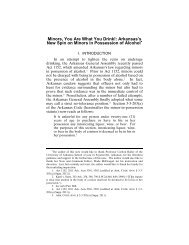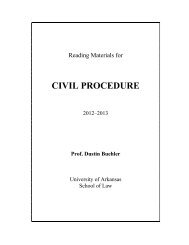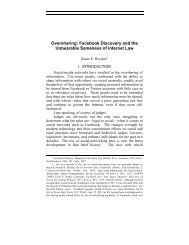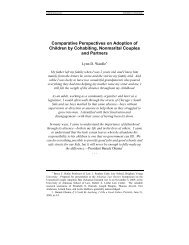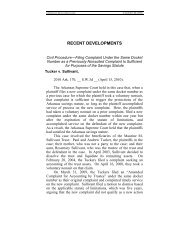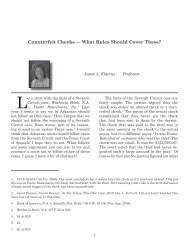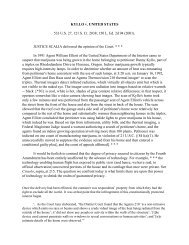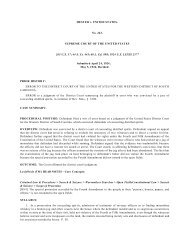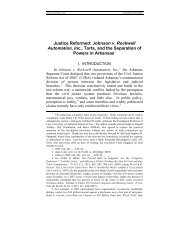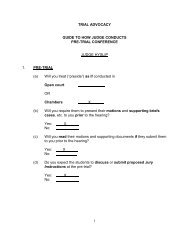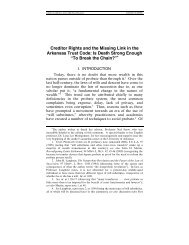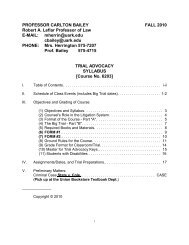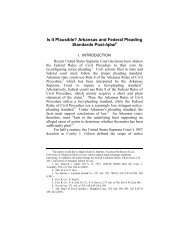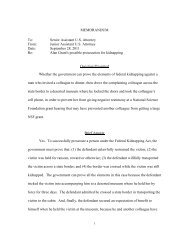PAYTON v. NEW YORK
PAYTON v. NEW YORK
PAYTON v. NEW YORK
Create successful ePaper yourself
Turn your PDF publications into a flip-book with our unique Google optimized e-Paper software.
Finally, we note the State's suggestion that only a search warrant based on probable cause to<br />
believe the suspect is at home at a given time can adequately protect the privacy interests at<br />
stake, and since such a warrant requirement is manifestly impractical, there need be no warrant<br />
of any kind. We find this ingenious argument unpersuasive. It is true that an arrest warrant<br />
requirement may afford less protection than a search warrant requirement, but it will suffice to<br />
interpose the magistrate's determination of probable cause between the zealous officer and the<br />
citizen. If there is sufficient evidence of a citizen's participation in a felony to persuade a<br />
judicial officer that his arrest is justified, it is constitutionally reasonable to require him to open<br />
his doors to the officers of the law. Thus, for Fourth Amendment purposes, an arrest warrant<br />
founded on probable cause implicitly carries with it the limited authority to enter a dwelling in<br />
which the suspect lives when there is reason to believe the suspect is within.<br />
Because no arrest warrant was obtained in either of these cases, the judgments must be reversed<br />
and the cases remanded to the New York Court of Appeals for further proceedings not<br />
inconsistent with this opinion.<br />
It is so ordered.<br />
CONCURBY: BLACKMUN<br />
CONCUR: MR. JUSTICE BLACKMUN, concurring.<br />
MR. JUSTICE WHITE, with whom THE CHIEF JUSTICE and MR. JUSTICE REHNQUIST<br />
join, dissenting.<br />
It is necessary in each case to assess realistically the actual extent of invasion of constitutionally<br />
protected privacy. Further, as MR. JUSTICE POWELL observed in United States v. Watson,<br />
supra, at 428 (concurring opinion), all arrests involve serious intrusions into an individual's<br />
privacy and dignity. Yet we settled in Watson that the intrusiveness of a public arrest is not<br />
enough to mandate the obtaining of a warrant. The inquiry in the present case, therefore, is<br />
whether the incremental intrusiveness that results from an arrest's being made in the dwelling is<br />
enough to support an inflexible constitutional rule requiring warrants for such arrests whenever<br />
exigent circumstances are not present.<br />
Today's decision ignores the carefully crafted restrictions on the common-law power of arrest<br />
entry and thereby overestimates the dangers inherent in that practice. At common law, absent<br />
exigent circumstances, entries to arrest could be made only for felony. Even in cases of felony,<br />
the officers were required to announce their presence, demand admission, and be refused entry<br />
before they were entitled to break doors. Further, it seems generally accepted that entries could<br />
be made only during daylight hours. And, in my view, the officer entering to arrest must have<br />
reasonable grounds to believe, not only that the arrestee has committed a crime, but also that the<br />
person suspected is present in the house at the time of the entry.<br />
n13 I do not necessarily disagree with the Court's discussion of the quantum of probable cause<br />
necessary to make a valid home arrest. The Court indicates that only an arrest warrant, and not a



